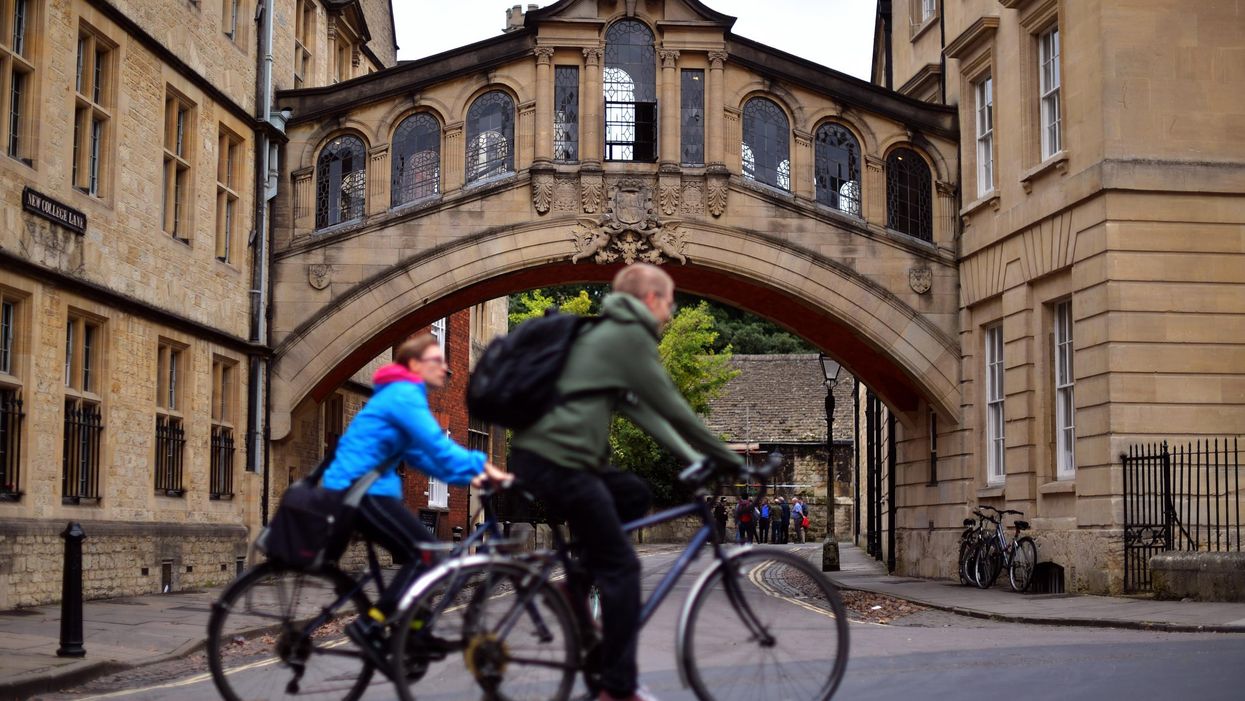News
Jessica Brown
Aug 17, 2017

Picture:
Getty
Oxford University is the world’s fifth most prestigious university. Those are some majorly high stakes for anyone wanting to get a place.
Human rights activist Malala Yousafzai is one of the many students who will be learning in the University's hallowed halls this September, having been officially accepted today.
For those of us who didn't get the grades to attend an interview however, the uni’s entry test questions are a rare insight into how the institution rates intelligence.
The uni’s tutors have shared some sample questions, and what they look for in students' answers, to give us a feel of what a real interview is like, and some of them are… Not what you might have expected.
1. Here is a list of three compounds, A, B and C. Which one is most soluble?
And the answer? Well, it’s not so important.
Biochemistry professor Mark Wormald, of the uni’s Corpus Christi College, writes:
We expect most candidates to say that they don’t know and that’s completely fine – what we are looking for is how the candidate works through the problem.
It’s not about the accuracy of the student’s thinking, since we don’t actually expect them to get the right answer. It’s more about how they react to getting the answer wrong, and how motivated they are to identify all the possible sources of error so that they can then test and eliminate each one in turn.
2. Here's a cactus. Tell me about it.
Biological sciences professor Martin Speight, of the uni’s St Anne's College, writes:
We give the student a cactus in a pot and a close-up photo of the cactus's surface structure and ask them to describe the object in as much detail as possible using the plant and the photo. We are looking for observation, attention to detail, both at the large and micro scale.
3. Ladybirds are red. So are strawberries. Why?
Biological sciences professor Owen Lewis, from Brasenose College, explains:
Red can signal either 'don't eat me' or 'eat me' to consumers. I'm interested in seeing how applicants attempt to resolve this apparent paradox.
4. Do bankers deserve the pay they receive? And should government do something to limit how much they get?
Economics and management professor, Brian Bell from Lady Margaret Hall, writes:
A simple answer might be that since banks are generally private firms and workers are free to work where they wish, then the pay they receive is just the outcome of a competitive labour market. A good candidate would wonder why it is that seemingly equivalently talented people can get paid so much more in banking than in other occupations. The key point about this question is trying to get candidates to think about the economics of pay rather than just whether they think it is fair or not.
5. Why do you think an English student might be interested in the fact that Coronation Street has been running for 50 years?
English literature professor Lynn Robson from Regent’s Park College, writes:
This could open up discussion about things such as techniques of storytelling; mixing humorous and serious storylines/ characters; how a writer might keep viewers or readers engaged; collaborative writing; the use of serialisation, and how writers/texts might move from being perceived as 'popular' (like Dickens, say) to be 'canonical'.
6. Which person (or sort of person) in the past would you most like to interview, and why?
History professor Ian Forrest, of Oriel College, writes:
The question is not so much about which person the candidate wants to meet, but what sort of issues the candidate wants to find out about (which can be quite revealing) and then working out the best way to do so.
7. What is language?
Modern languages professor, Helen Swift, of St Hilda’s College, writes:
Students sometimes say they like studying Spanish, for example, because they 'love the language'. In order to get a student thinking critically and analytically, the question would get them to consider what constitutes the language they enjoy – is it defined by particular features or by function (what it does)? How does form relate to meaning?
8. If you could invent a new musical instrument, what kind of sound would it make?
Music professor Dan Grimely, or Merton College, writes:
I'm interested in answers which demonstrate a critical imagination at work - what kinds of sounds do instruments/voices make now, and how might these be imaginatively extended/developed? Are there new ways of producing sound (digital media) which have transformed the way we listen or understand sound? Is the idea of an 'instrument' somehow outdated these days, and can we imagine more symbiotic/hybrid ways of generating/experiencing musical sound?
9. An experiment appears to suggest Welsh speakers are worse at remembering phone numbers than English speakers. Why?
Psychology professor Nick Yeung, of University College, explains:
Numbers are spelled differently and are longer in Welsh than in English, and it turns out that memory (and arithmetic) depend on how easily pronounced the words are. I would hope the student would pick out this connection between memory and how easy to spell or pronounce a word is, and how that relates to spelling and pronunciation in Welsh versus in English. This question is meant to be deliberately provocative, in that I hope that it engages candidates' intuitions that Welsh people aren't simply less clever than English people!
More: Could you pass the world's toughest school exam?
More: Can you pass the tough new test to get into Cambridge? Take the quiz
Top 100
The Conversation (0)













